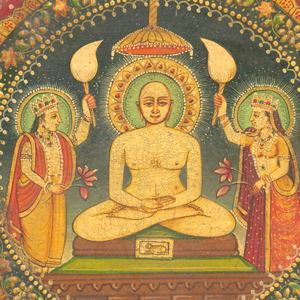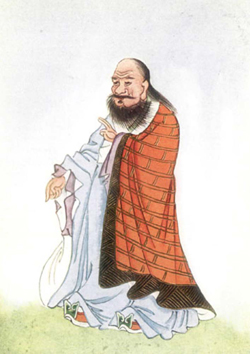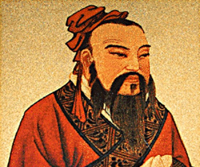
Your complimentary articles
You’ve read one of your four complimentary articles for this month.
You can read four articles free per month. To have complete access to the thousands of philosophy articles on this site, please
War & Philosophy
Non-Violent Voices
Oidinposha Imamkhodjaeva assesses arguments against violence among ancient Asian philosophies.
The quest for peace is one of the most important endeavours of all time and one of the oldest. Several of the major Asian philosophical traditions have, from ancient times, tried to find the means to justify and achieve peace and avoid violence and war. Here I will focus on Jainism, Daoism, and the teachings of Mo Tzu and Mencius. I will briefly sketch the similarities and dissimilarities of their views on pacifism, just war, and revolution. Jainists, Daoists, Mo Tzu and Mencius were all lovers of peace in unique ways.
Jainist Non-Violence

Mahavira meditating
Jainism as a philosophical movement appeared in India before or around the same time as Daoism, Mohism (Mo Tzu) and Mencius in China: about the sixth century BC. Jainism and other Indian philosophical schools were markedly different in their historic background from the Chinese schools: India was not plunged into civil war as China was for several hundred years. But India was affected by movements which enforced the supremacy of the priestly Brahman class and its philosophy with an iron fist. Jainism sprung up as a reaction against this ruling Brahman philosophy. It emerged as a full-fledged philosophy of non-violence during the life of Mahavira (born 599 B.C.). It was often considered to be an offshoot of Buddhism, but it stood out from the start as a philosophy promoting the concept of ahimsa, meaning non-harm or non-injury, simultaneously advocating tolerance, on the grounds that no one holds the absolute truth and everyone has his or her own standpoint. Ahimsa had an enormous influence on other Indian schools.
This principle of non-violence or non-injury is based on the Jainist philosophical and sociopolitical worldview. Jainists divide the universe into two types of things, the living and the non-living. Jainists state that each living being, not only humans, but the smallest insects, plants, reptiles and birds, has a soul, called jiva. Non-living things, which lack a soul, are called ajiva. Because each living being has a soul/ jiva, you are forbidden to harm any living being, even the smallest insect. Jainism prescribes that we should not harm any life, and in particular we should not kill any life, because all life has equal rights on this earth. You must understand that if you kill any living thing, you kill a soul.
The core of Jainist metaphysics is known as Anekânatavâda, or the manyness of reality. Reality possesses innumerable qualities, and any object possesses an infinite number of characteristics. Ordinary people cannot comprehend all the qualities of a thing. Human knowledge is limited and relative regarding the innumerable characteristics of an object. Thus Jain metaphysics is a relativism, in the sense that all truths are relative to their believers. Any standpoint or statement can be only partially true, and no statement or standpoint can claim to be absolute. This worldview is considered to be an extension of the Jain ethical imperative of ahimsa into the field of philosophy, as a form of tolerance.
This argument goes as follows. At the center of Jain logic lie two inter-related methods, Nayavada, or the method of seven standpoints, and Syadvada, or the method of sevenfold predication. The former involves showing that any statement can be of only limited, not absolute, validity, because all statements are contextualized. The second method involves the recognition that there are a limited number of possible types of statements that one can make about an object, including positive attribution, negative attribution, and inexpressibility. By combining these two methods, the Jains developed a logic according to which any statement at best represents a single perspective (Ekanta). In contrast, in a more global approach, the Jains argue for the adoption of all possible points of view from multiple perspectives (Anekinta).
Whenever Jains talk about ethics, they talk about duty, and they say that the highest and best duty of a human being is to practice non-violence, recognizing that the essential feature of all life is soul. Ahimsa is built into the core of Jainist philosophy, ethics and practice. Even though it was founded more than two thousand years ago, its adherents are still active in the political discourse of India and worldwide. Their voice of love and care for the environment is influential even today.
Daoist Non-Violence

Laozi articulating
Now let’s turn our attention to Daoism. Like Jainism, nothing is known for certain about the founder of Daoism, Laozi (Lao Tzu) – there are only legends. Daoist philosophical and political teachings were written down and compiled by later followers. We know that Daoist monks translated Buddhist works, and that Buddhism, like other Indian philosophies, was influenced by ahimsa. Fung Yu-lan, a famous Chinese philosopher, views the preservation of life and the avoidance of injury as the starting point of Daoism. But Daoist ideas of non-violence are different. Their reasons for opposing war and favoring non-violence were the result of the historical contexts. Daoism is comparable to Jainism only on a superficial level.
The Dao De Jing is an ancient Chinese classic traditionally taken as a representative Daoist text. It expresses a distinctive philosophy from China’s Warring States Period (403-221 BC), and is one of the most influential works in the intellectual tradition of China, with hundreds of commentaries written over two millennia. The Dao De Jing has three basic anti-war arguments:
(1) The onto-cosmological argument: War creates a disruption of the natural pattern of things in the world.
(2) The moral argument: Preserving life is morally right and killing is morally wrong.
(3) The political argument: It is wrong to employ war as a means to political gain since warfare will inflict great sorrow upon the state and its people, as well as on the ruler.
All three arguments are presented from both duty-based and utilitarian perspectives. The first two arguments are made clear in Chapter 30, where it says, “After a great battle, there is an ominous year of famine.” The phrase ‘an ominous year’ (xiongnian) refers to a year of calamity after farm horses have been used as war horses and farmers drafted into the army. Most commentators tend to view this statement as a utilitarian or economic argument against war. But Chapter 30 speaks not only of war in terms of the disruption of natural patterns of life, it also makes the onto-cosmological argument when it claims that nothing is more unnatural than war due to its capacity to disrupt the ordinary courses of nature, such as farming, leading to the destruction of harmony and social order. Chapter 46 puts it thus:
“When the dao (natural way) prevails in the world,
Horses are used in the farm;
When the dao (natural way) does not prevail in the world,
War horses are bred just outside the city walls.”
Daoism is against all war. While the Dao De Jing does not elaborate on warfare specifically, its opposition is implied by its worldview. Daoism advocates non-activity or non-intervention (wu-wei). For Laozi, whoever acts, harms; and whoever grabs, lets slip. Therefore the sage does not act, and so does not harm; the sage does not grab, and so does not let slip. Laozi compares ruling a big country to cooking a small fish, and cautions against too many changes. For him, if the rich and powerful are arrogant, they are doomed. Daoism is skeptical of politics. When King Wei of Chu asked Zhuangzi (Chuang Tzu), a famous Daoist scholar, to serve as Prime Minister, he turned down the offer.
Mohist Non-Violence
Although Mohism is not as well known as other ancient Chinese schools, the Mohist contribution to the Chinese view of warfare cannot be underestimated, since among all major schools the most famous indictment of war comes from Mo Tzu (480-390 BC). He condemns war both on moral grounds and on utilitarian principles. For him, war does not pay, even for the victor. There is nothing useful about victory, as the loss outweighs the spoils. Mo Tzu’s comment on the intention of the state of Chu to attack the state of Song deserves mention here: since Chu possessed abundant land but not a large population, it was unwise to sacrifice what was insufficient for what was superfluous. Moreover, attacking a state that has done no wrong is not benevolent. It is illogical that while killing one person is forbidden and seen as a dreadful crime, slaughtering whole armies is accepted. Mo Tzu also criticizes the double standard in judging domestic and international politics.
For Mo Tzu, partiality in human relations causes all the great harms in the world, so he suggests that partiality be replaced by universality. He proposes what he called ‘universal love’ (jian-ai), arguing, “if men were to regard the states of others as they regard their own, then who would raise up his state to attack the state of another?” Only universal love will make the world peaceful and orderly.
Although the Chinese tradition generally stresses the importance of avoiding war, the notion of ‘just war’ or ‘righteous war’ (yizhan) for the sake of maintaining order in the world, or the idea of legitimate and sanctioned acts of violence (for example, punishing the enemies of public order) is by no means absent. In the Mozi (The Book of Master Mo), Mo Tzu allows for non-offensive war in the chapter ‘Against Aggression’. There he articulates the notion of righteous war and contends that the wars initiated by three sages, Yu, Tang, and Wu, should not be called ‘attacks’ but ‘punishments’. He makes a distinction between ‘aggressive attack’ and ‘offensive punishment’: the former deploys forces for the purpose of profit, whereas the latter deploys forces for the purpose of preserving order.
Confucian Non-Violence

Mencius considering
Mencius (371-289 BC), the greatest Confucian thinker after Confucius himself, also denounces offensive wars. For him wars involve too many casualties. So although the central authority may wage punitive war against a local ruler, rival states should not attack one another. He regards all the wars in the Spring and Autumn period of Chinese history (722-481 BC) as unjust. Death is an inadequate punishment for those who launch a war. Those who are experts in waging wars deserve the most severe penalty. Boasting of military expertise is a grave crime.
Mencius argues that a benevolent king has no rivals in the world because he can win the support of the people, even oppressed people in another country. Indeed, sometimes wars have to be embarked on because they are just. For Mencius, the criterion of whether a war is just lies in how the war would benefit the people of the enemy country. If the people of that country have been starving, freezing, exploited and abused by their king then they will welcome liberation. They will not put up any resistance; instead, they will bring food and drink to reward the incoming troops. So whoever wins the hearts of the people will win the war. As Mencius says, “A humane king has no match.”
When King Hsiang of Liang asked how to achieve world peace, Mencius pointed to unity as a solution. When asked who can unify the world, Mencius answered that the one who does not delight in killing can unite it.
Another novel idea introduced by Mencius into Chinese political thinking is the idea of revolution. If the ruler is not humane – if he abuses the people instead of taking care of their welfare – then he can be legitimately removed. This view may appear contrary to what Confucius himself teaches, whereby the ruler is revered and the subjects always remain subjects. However, Mencius defended his view by asserting that when the ruler is a ‘lone man’ loathed by everyone, removing the lone man from the throne is not usurpation.
Although Mencius argued that the validity of rulership depends on the people’s acceptance, he does not think that the task of royal replacement should be placed in the peoples’ hands. The people will have neither the political expertise nor the military competence to succeed in this task, and a revolution initiated by the people will probably bring the whole nation into complete chaos. Therefore the task should fall on the shoulders of the ministers who originally assisted the ruler. As the famous scholar of Chinese thought Angus Graham states, “Mencius is not a defender of popular revolution. Ideally, he thinks the tyrant should be removed by his own ministers, and, among ministers, by those of the old fashioned kind.” (Disputers of the Tao: Philosophical Argument in Ancient China, 1989). These ministers themselves have to have some qualifications: they must have the peoples’ well-being in mind and be wise enough to make right judgments. There is only a slight margin between legitimate overthrow and illegitimate usurpation, and the margin is set by the ministers’ intent.
Confucianism has often been charged with supporting feudalism. But we can see that Mencius would never support a form of feudalism that does not include a humane king, prudent ministers, and contented people.
Conclusion
We have considered four ancient Asian philosophies that advocated peace. The Jainists were absolutely opposed to violence or harming even the smallest living thing. The Daoists regarded war as a destruction of the natural order and advocated passivity. The Mohists thought war was bad but sometimes necessary to preserve order. The followers of Mencius also thought war was bad but sometimes necessary to defend justice. All these ideas are relevant today.
© Oidinposha Imamkhodjaeva 2018
Oidinposha Imamkhodjaeva is an assistant teaching professor in Philosophy at Penn State University. She has two PhDs!
Further Reading
Hsiu-Chen Chang, ‘On the Historicity of the Tao Te Ching’, Comparative Literature Studies, vol. 35, no. 2, 1998
Christopher Chapple, ‘Sources for the Study of Jaina Philosophy: A Bibliographic Essay’, Philosophy East and West, vol. 50, no. 3, 2000
Ellen M. Chen, The Tao Te Ching: A New Translation with Commentary, Paragon House, 1989
Carine Defoort, ‘The Growing Scope of ‘Jian’ 兼: Differences Between Chapters 14, 15 and 16 of the ‘Mozi’’, Oriens Extremus, vol. 45, 2005
Angus C. Graham, Disputers of the Tao: Philosophical Argument in Ancient China, Open Court, 1989
William G. Kirkwood, ‘Revealing the Mind of the Sage: The Narrative Rhetoric of the ‘Chuang Tzu’, Rhetoric Society Quarterly, vol. 22, no. 3, 1992
D.C. Lau (trans.), Mencius, Penguin, 1970
Geoffrey MacCormack, ‘The Legal Philosophy of Mo Tzu’, ARSP: Archiv Für Rechts- und Sozialphilosophie / Archives for Philosophy of Law and Social Philosophy, vol. 79, no. 3, 1993
Stephen Mitchell, Tao Te Ching: A New English Version, with Foreword and Notes, Harper Collins, 2000
Jayandra Soni, ‘Basic Jaina Epistemology’, Philosophy East and West, vol. 50, no. 3, 2000









